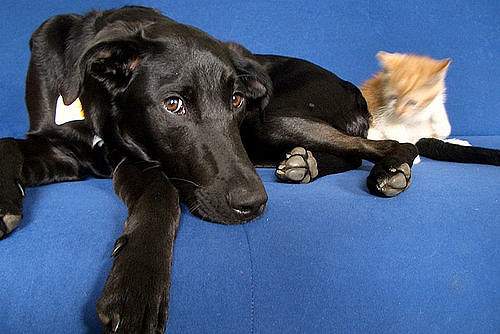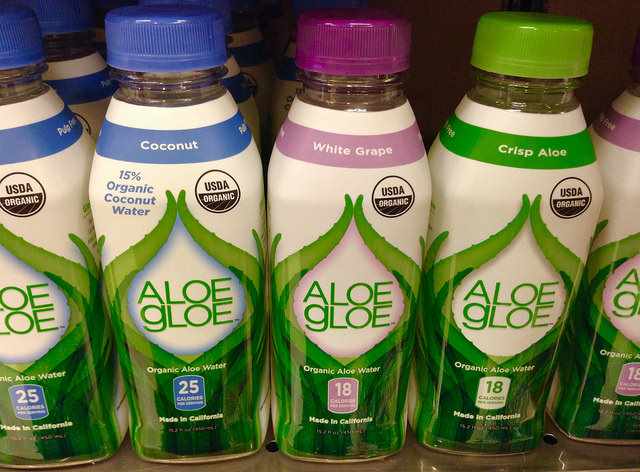Can Aloe Vera Gel Be Used On Pets?


We humans have been using aloe vera in many forms for at least 6,000 years now. Dubbed the “plant of immortality,” this incredible green plant has been used as everything from a cooling sunburn cure to a laxative. We love drinking it and rubbing it on our skin, but can aloe vera gel be used on pets or given as a treat?
Here’s everything you need to know before you use aloe vera gel for your cat or dog.
Is Aloe Vera Safe for Pets?
The answer is yes and no. There are a lot of products out there with aloe vera gel that are safe for pets. Generally speaking, your safest bet is to look specifically for products that were designed for dogs and cats, and have been labeled as pet-safe. The reason why you need to be careful with giving your dog or cat aloe vera gel is because some parts of the plant are dangerous. This means you should avoid DIY aloe vera recipes for pets and keep your aloe vera houseplant away from your kitties and puppies.
Ingesting aloe vera gel can have a range of side effects for pets including vomiting, diarrhea, loss of appetite, or even tremors. Over time, if you keep giving your pet aloe vera, he or she may exhibit signs of depression or urinary changes.
Why Dogs and Cats Can’t Eat Aloe Vera
Aloe vera contains saponins, which are the specific elements that can cause the side effects we’ve been talking about. According to the highly regarded Natural Health Bible for Dogs and Cats, written by veterinarian Shawn Messonnier, feeding your dog or cat pure aloe vera can result in severe diarrhea, muscle spasms, weight loss, and generally a really miserable pet.

But maybe your friends or family have told you that they give their dogs and cats aloe vera all the time and it’s safe. Don’t listen to them! According to the American Kennel Club, people seriously underestimate how often their pets have food poisoning. Many pet owners give their animals things like raw fish, meat, and eggs. Afterward, these people don’t realize that their pets are actually suffering from abdominal pain, dizziness, or a fever because we tend to just see the more obvious signs like vomiting and diarrhea. So, no, just because you know someone who gives their dog or cat aloe vera and sees no side effects does not mean that there are no side effects.
Can Dogs and Cats Drink Aloe Vera Juice?
For humans and animals alike, the reviews of aloe vera juice are mixed. There has been a ton of marketing hype around aloe vera gel juice but there is not much actual scientific data to back it all up. Worse yet, there have been studies that show aloe vera gel juice to be toxic to animals. While the study did not specifically look at whether or not aloe vera gel juice is toxic to dogs and cats, it did find that it is toxic for rats and mice.
Bottom line: Why take the chance? There are no proven benefits to giving your pet aloe vera gel juice and it has the potential to cause serious problems.

Is Aloe Water Safe for Pets?
Aloe vera water is another new drink trend. It is supposed to do everything from enhancing your digestion to removing toxins to reducing inflammation. Aloe Water is slightly different from Aloe Juice. To make aloe vera juice, typically aloe vera gel is blended with citrus juice. To make aloe vera water, the aloe vera gel is just mixed with water. While some claim it’s a great source of Vitamin C, the risks remain the same. For this reason, you should avoid giving both aloe vera gel juice and water to your cat or dog.
So, Is Aloe Vera Toxic to Pets or Not?
The ASPCA lists aloe as toxic to both dogs and cats. They list the possible side effects of ingestion as “vomiting, depression, diarrhea, anorexia, tremors, change in urine color.” The Pet Poison Helpline expands to say, “Aloes contain anthraquinone glycosides which are purgatives (medications that encourage bowel movements). When ingested, these glycosides are metabolized by intestinal bacteria forming compounds that increase mucus production and water in the colon. This can result in vomiting and diarrhea. Other clinical signs seen with aloe vera ingestion include depression, anorexia, changes in urine color, and rarely, tremors.” In other words, don’t give your beloved fur baby aloe vera in any shape or form, EXCEPT for pet safe aloe vera.
What Is Pet Safe Aloe Vera?
So, if aloe vera gel is toxic for dogs and cats, why do some vets recommend it? That brings us back to the topic of pet safe aloe vera gel. When you buy aloe vera products for dogs and cats that have been labeled as pet safe, that means that the product has had any toxic latex removed during processing so you can safely put it on your pet. This is an important distinction to make because the aloe vera plant has two parts to it. There’s the gooey green center of the plant, which is safe to use, and then there is the white outer edge of the plant that contains latex, a white sap. This latex is the only part that is toxic and its removal is what makes certain aloe vera gels safe to be used for pets.

In fact, these pet safe aloe vera gels are not only okay for use but actually offer an incredible treatment for a range of skin conditions.
How Can Aloe Vera Gel Be Used On Pets?
When used externally, aloe vera has numerous benefits. It is antibacterial, antifungal, and anti-inflammatory. It is a great option for soothing pets’ skin while reducing inflammation. It has also been shown to promote healing with helping to treat allergic reactions. Pet safe aloe vera gel can be used on pets for a range of wounds, bites, stings, and burns, as well as for conditions like eczema, or any other skin irritations like. Typically, it is recommended for use twice a day to help treat dogs and cats.
Your Vet’s Recommendation for Aloe Vera Gel
It’s best to avoid self-diagnosing your pet. If your dog or cat is having a problem, chat with your vet. Any good veterinary clinic can advise you over the phone and tell you if it’s worth a trip to the vet.
Image courtesy of FastPhive, MIke Mozzart, and latteda via Creative Commons by 2.0.

